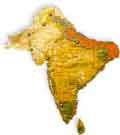 HOME
HOME

MUSLIM MATRIMONIALS
(Marriage Ads)
Gujarati Muslim Weddings

By Meriel Beattie
Reprinted from BBC Online, published Thursday, 16 December, 1999
Zawaj.com received an e-mail from Wendy, who had been invited to a Gujarati wedding and had no idea what to expect. She had learned a Hindu song and dance and wondered if that was appropriate. Some of our readers were kind enough to write in with descriptions of Gujarati weddings. Here they are:
This is a description of a gujerati wedding, at least in our neighbourhood, but I know that there are differences in some of the specific aspects.
There are three main events in the Gujerati wedding - These are :
- The Mehndi
- The Nikah
- The Walimah
First the Mehndi takes place during the week before the Nikah, sometimes the night before. All the ladies are invited for an evening meal at the bride's family home. Traditional food which is served includes "Khitchra" a meat and barley broth. Mehndi is the artistic drawing in Henna of patterns and flowers on the hands and feet (and nowadays the neck!) of the bride and the other ladies. This can now be bought as a transfer (I think it is called temporary tattooing !) The expert ladies will draw designs for the other ladies and religious and other poems are recited about the "sad" occasion of the departure of the bride to her marital home.
There is plenty of good-humoured teasing between the families of the bride and groom, usually ending with the two mothers being bound together in a long scarf when they hug each other to say good bye. This increases the bond between the two families, not just the bride and groom ! This is an all ladies night. The men have to amuse themselves. Usually, this means the groom taking all the men to a restaurant! There is no "bachelor party" or "stag night". The guys make up the mischief later!
The actual wedding day is the Nikah ceremony, which is only attended by the men at the mosque. After the bride has been formally asked of her acceptance of the proposal, the witnesses go to the masjid where the Nikah is completed. This includes quotations from Qur'an and Hadith (usually the first part of Surah Nisaa and Ahaadith relating to marriage) in Arabic and translations as necessary. Sweets are distributed to the guests, sometimes dates or other small sweets in elegant "finger-parcels".
Often, the elders will distribute money to the children, for them to buy some more sweets!
There usually follows a reception where Biryani or Curry and Naan is served and the gifts are exchanged. There are no speeches and the men and women are segregated. At this time, the groom joins the bride. The bride's brothers will "prevent" the groom from reaching the bride until a sufficiently handsome "ransom" is paid to them! Other "ransom" tactics are also employed to fleece the young man of as much money as possible, these include hiding his shoes (many Gujerati muslims have a shoes-off-at-the-door policy in the home) and occupying the seat next to the bride etc.
The couple then depart together. Sometimes, a relative will give over his house to the couple, or they will go to a "secret hideaway". If their destination is (or becomes) known, one can expect the groom's friends to spend the best part of the night camped outside shouting at and generally disturbing the happy couple! Best suggestion, keep the destination a secret! It has been known for the boys to telephone the couple at regular intervals or leave alarm clocks all over the house set for various times in the night!
Usually, the couple return the next day to the groom's parent's home the next morning where the Walimah is held and a lunch is served. There are some rituals which stem from the Hindu tradition, which I have omitted. Activities do vary according to the family's piety and financial ability.
-Mohammed Randeree
Thank you Mohammed for that very detailed description. Now here's another description from another Muhammed:
I am of Gujrati background and wish your family well and congrats on the occassion. However, I don't think the family will take well to a dancing and singing woman, albeit with good intentions. In fact, the males and females are separated, as with most Muslim functions. However, if you are only with the women section, you could perhaps, I've seen, read poems or other non-display type congrats (and no men should see you or hear your voice).
You did mention it's going to be a western wedding. Well, I don't know what that means, i.e. mixing of the men and women, musical instruments, no head covering for women? But this is forbidden if they are Muslim. Most of us here practice a simple traditional Islamic wedding without fanfare and opulence. Of course, everyone dresses their best, brings in gifts, and with their best manners.
Gujratis tend to be a cosmopolitan bunch, scattered around the world more than any Indian group I know. So, the "Indian culture" itself is not in us. We go by Islam as a way of life, and the marriage tends to be Islamic. We still enjoy the language and the food of our heritage, but the singing and dancing is passe, left for the non-Muslim ancestors. A gift, and prayer to God for their success, and your presence is pretty much what we practice. Of course, I don't know the family, so I generalize from what I've seen. Lastly, why not call them up and ask them, how the arrangements will be made?
-Regards, Muhammed
